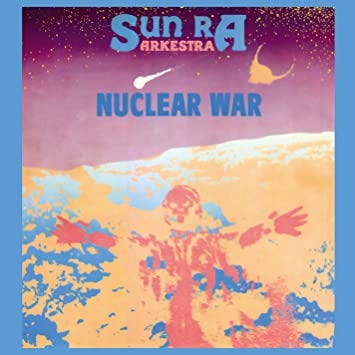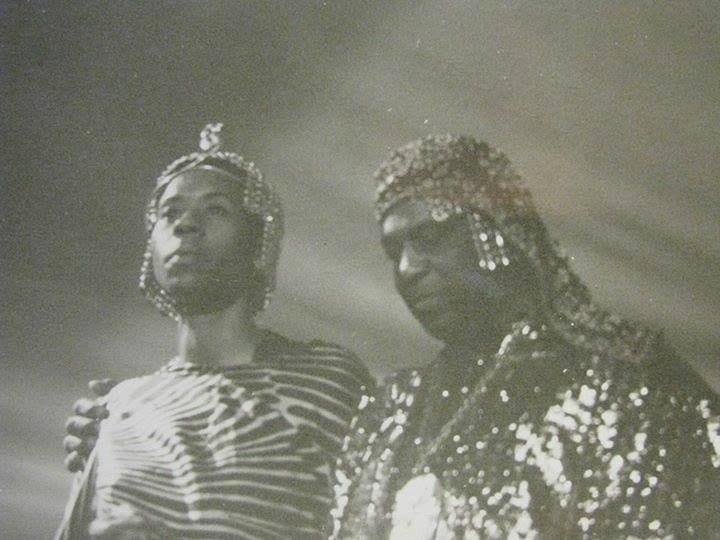So glib you can’t predict whether it’s a prayer for war or a warning against it, Sun Ra’s “Nuclear War'' (1982) is a preemptive war memorial, a song sculpted at the altar of imminent danger, but in a spirit of maddening and defiant play. Ra mocks the aimless militancy and rabid expansionism of nations ruled by fear they mistake for power, and destined to fail because they betray the laws of nature. This is the music of surrender to forces so dumb and destructive they deserve unrelenting derision, and so alarming if considered in earnest, that to discuss them it’s best to do what Ra does and look askance and grimace and grunt: they’re talking about… nuclear war, as if confessing some belligerent rumor that dissipates once made public, for it cannot withstand the collective focus, which calls its bluff.
Outside of Ra’s lament, even vague allusions to the atomic bomb in music have been timid and scarce, with many musicians choosing weeping odes to peace in protest of war instead of direct confrontation of its instruments. Guns appear everywhere in song, fetishized and used for seduction, but nukes duck and dissemble the muses. Sun Ra’s insistence on naming the threat and releasing us from the purgatory of metaphor is cathartic. He chants like a general and his band members respond like the reanimated corpses of fallen soldiers ambling into the bombed out mist: yeah! Affirming the gossip about nuclear war that Sun Ra announces by trivializing it, welcoming it. This might be the most effective protest song ever made because rather than decry injustice until it becomes saccharine and unbearable to listen, stuck in time reifying that injustice by denouncing it, “Nuclear War” joins the unjust activity, revels in it as an accomplice as if the potential suffering of nuclear fallout is up to its potential victims. The spiritual chasm between detractors and proponents of such a war is bridged by shared consequences in Ra’s hymn: gonna blast you… so high in the sky… kiss your ass goodbye. A situation of total powerlessness becomes empowering when danced and clapped into recognition like this, to listen and sing along is to gain agency and beckon the cataclysm you dread so that it gets suspicious and retreats or at the very least feels ridiculous, like some mangled monster approaching everything that is decent. Before any weapons detonate, nuclear war is psychic warfare, monsters under the bed, ghosts in the shadows, and Sun Ra triumphs by appealing to the collective vanity in hopes that the image of being casually blown to smithereens by the foolishness of your own unchecked ambition or unacknowledged haunts is enough to inspire a modest reassessment of everything.
Whatchu gonna do, without your ass… Ra goads. Refusing to dignify a farce with the glints of tragedy and glamor that many anti-war anthems rely on is Ra’s brilliant way of exposing the ineptitude of a species that would destroy itself in the name of progress or call the capacity for self-immolation advancement. He teases in a cryptic don’t talk about it be about it tone that, when the topic is mutually assured destruction, implicates everyone heartily running toward it as a minion of evil, a junk personality. I think by this stage in his time on the planet Sun Ra (having “arrived” as he put it, 1914) was rightfully disgusted by the vagrant bravado of human beings who he had witnessed leap from blunder to blunder, war to war, prejudice to prejudice, eagerly, sheepishly, with no sense of the limits of manmade concepts and no humility in the face of the creator. Initially Columbia Records rejected the “Nuclear War” demo; maybe they were trying to remain stoic during the cold war. An Italian label, Y Records, accomplished a limited release and then Chicago-based Atavistic reissued it in 2001, less than a month before 9/11. Radiation… mutation… Ra repeats in a loop with his chorus of respondents drifting in somberly to amplify his predictions. He surrounds the track with tender lullabies on the album: June Tyson singing “Smile” in a slow, swaying cadence that is more suggestive of mourning than smiling, a duet of “Sometimes I’m Happy” between June and Ra, an organ-heavy version of Duke Ellington’s “Drop me off in Harlem,” and Sun Ra composition “Celestial Love” that in the context sounds like the direct foil of catastrophic war and an earnest call for divine intervention, which rather than calling it, enacts it, becomes it. Denunciation becomes the essence of prayer.
Do we need the ever-redundant threat of the fall to ascend to our fullest potential? Is a grammar of destruction extracted from the televisual becoming that tenebres mirror we walk through into the forest of motives, where we feel virtuous for naming our killers until someone names us as theirs. Do maritime karamas and wartime karmas meet in the middle to sing “Smile” and the retreat to detonate in a miasma of wicked laughter, reapers humming sometimes I love you, sometimes I hate you, but when I hate you, it’s cause I love you like god made them do it, mandated the double edge of grace and gather. Sun Ra’s blunt theatrics on “Nuclear War '' teach without didacticism. They ask, how can people call themselves powerful while living at the mercy of their lethal inventions? How can we use the cusp of extinction as our pivot into serenity and agreement?
“Nuclear War '' is upbeat, almost optimistic at the prospect of obliteration. Live versions sound like one-song festivals and ad lib on the standard with questions like: don’t you care about yourselves, don’t you about your soul? Hiply leaning into a comedic guilt trip, the choir chants: burnt trees, burnt seeds, burnt grass and burnt ass. Ra constantly reminds us in tone and tension/attention, to not get lost in despair. He protects his sweet innocence with vulgarity and humor where necessary because, as he put it, the planet isn’t ready for his most sincere poetry, humans are a little too weak and shallow to withstand ideas that meaningful. He intentionally bypassed the consciousness for the subconscious using tone and tricks like making a sad poem about inhumanity funny on the surface. Our eternal sonic bomb shelter, Sun Ra displays his christ like tendencies on “Nuclear War,” where his offended soul becomes a shield for all of ours, a shield that sings its danger for pleasure expecting the myth to spare us if we entertain it, and so far—






